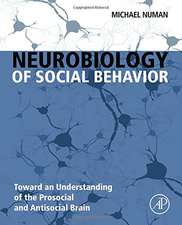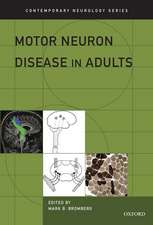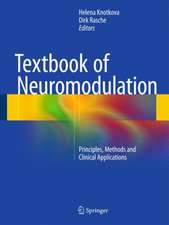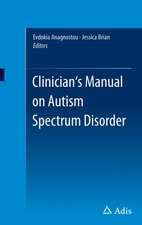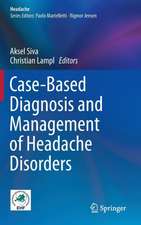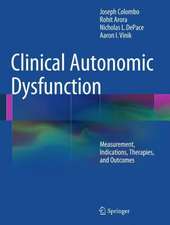Neurochemical Aspects of Excitotoxicity
Autor Akhlaq A. Farooqui, Wei-Yi Ong, Lloyd A. Horrocksen Limba Engleză Hardback – 16 oct 2007
| Toate formatele și edițiile | Preț | Express |
|---|---|---|
| Paperback (1) | 1217.41 lei 6-8 săpt. | |
| Springer – 28 oct 2010 | 1217.41 lei 6-8 săpt. | |
| Hardback (1) | 1223.55 lei 6-8 săpt. | |
| Springer – 16 oct 2007 | 1223.55 lei 6-8 săpt. |
Preț: 1223.55 lei
Preț vechi: 1492.14 lei
-18% Nou
Puncte Express: 1835
Preț estimativ în valută:
234.12€ • 244.46$ • 193.33£
234.12€ • 244.46$ • 193.33£
Carte tipărită la comandă
Livrare economică 15-29 aprilie
Preluare comenzi: 021 569.72.76
Specificații
ISBN-13: 9780387730226
ISBN-10: 0387730222
Pagini: 290
Ilustrații: XVIII, 290 p.
Dimensiuni: 156 x 235 x 19 mm
Greutate: 0.61 kg
Ediția:2008
Editura: Springer
Colecția Springer
Locul publicării:New York, NY, United States
ISBN-10: 0387730222
Pagini: 290
Ilustrații: XVIII, 290 p.
Dimensiuni: 156 x 235 x 19 mm
Greutate: 0.61 kg
Ediția:2008
Editura: Springer
Colecția Springer
Locul publicării:New York, NY, United States
Public țintă
ResearchDescriere
About 40% of central nervous system synapses use glutamate as the neurotransmitter. Over-stimulation of glutamate receptors produces neuronal injury or death by excitotoxicity, which is closely associated with neurochemical and neuropathological changes involved in acute neural trauma (stroke, spinal cord trauma, and head injury) and neurodegenerative diseases such as Alzheimer disease, Parkinson disease , Huntington disease, amyotrophic lateral sclerosis (ALS), Creutzfeldt-Jakob disease, Guam-type amyotrophic lateral sclerosis/Parkinson dementia (ALS/PDC), and multiple sclerosis.
In the past decade, our understanding of the biochemistry, molecular biology, and neuropathology of the glutamate transporters and receptors has exploded. It is becoming increasingly evident that molecular mechanisms, which govern the transfer of the death signal from the neural cell surface to the nucleus, depend on lipid mediators and on cross talk among excitotoxicity, oxidative stress, and neuroinflammation, and that interactions among these three processes play a major role in neuronal cell death during acute neural trauma and neurodegenerative disease. These processes may be primary initiating points in neurodegeneration or they may be the end result of the neurodegenerative process itself.
Neurochemical Aspects of Excitotoxicity provides extensive insight into glutamate transporters and receptors, including their role in the brain with other neurochemical parameters in excitotoxicity, and possible treatments. This book will be of interest scientists already working in the field of excitotoxicity who are interested in gaining a broader understanding of this complicated subject area, as well as graduate students and neurologists who are curious about a common cause of neuronal injury and neurological disorders.
In the past decade, our understanding of the biochemistry, molecular biology, and neuropathology of the glutamate transporters and receptors has exploded. It is becoming increasingly evident that molecular mechanisms, which govern the transfer of the death signal from the neural cell surface to the nucleus, depend on lipid mediators and on cross talk among excitotoxicity, oxidative stress, and neuroinflammation, and that interactions among these three processes play a major role in neuronal cell death during acute neural trauma and neurodegenerative disease. These processes may be primary initiating points in neurodegeneration or they may be the end result of the neurodegenerative process itself.
Neurochemical Aspects of Excitotoxicity provides extensive insight into glutamate transporters and receptors, including their role in the brain with other neurochemical parameters in excitotoxicity, and possible treatments. This book will be of interest scientists already working in the field of excitotoxicity who are interested in gaining a broader understanding of this complicated subject area, as well as graduate students and neurologists who are curious about a common cause of neuronal injury and neurological disorders.
Cuprins
Preface.- Acknowledgments.- Glutamate and Aspartate in Brain.- Excitatory Amino Acid Receptors in Brain.- Multiplicity of Glutamate Receptors in Brain.- Glutamate Transporters and their Role in Brain.- Excitatory Amino Acid Receptors and their Association with Neural Membrane Glycerophospholipid Metabolism.- Glutamate Receptors and their Association with Other Neurochemical Parameters in Excitotoxicity.- Possible Mechanisms of Neural Injury Caused by Glutamate and its Receptors.- Glutamate Receptors and Neurological Disorders.- Endogenous Antioxidant Mechanisms and Glutamate Neurotoxicity.- Glutamate Receptor Antagonists and the Treatment of Neurological Disorders.- Future Perspectives: New Strategies for Antagonism of Excitotoxicity, Oxidative Stress and Neuroinflammation in Neurodegenerative Diseases.- Index.
Textul de pe ultima copertă
About 40% of central nervous system synapses use glutamate as the neurotransmitter. Over-stimulation of glutamate receptors produces neuronal injury or death by excitotoxicity, which is closely associated with neurochemical and neuropathological changes involved in acute neural trauma (stroke, spinal cord trauma, and head injury) and neurodegenerative diseases such as Alzheimer disease, Parkinson disease, Huntington disease, amyotrophic lateral sclerosis (ALS), Creutzfeldt-Jakob disease, Guam-type amyotrophic lateral sclerosis/Parkinson dementia (ALS/PDC), and multiple sclerosis.
In the past decade, our understanding of the biochemistry, molecular biology, and neuropathology of the glutamate transporters and receptors has exploded. It is becoming increasingly evident that molecular mechanisms, which govern the transfer of the death signal from the neural cell surface to the nucleus, depend on lipid mediators and on cross talk among excitotoxicity, oxidative stress, and neuroinflammation, and that interactions among these three processes play a major role in neuronal cell death during acute neural trauma and neurodegenerative disease. These processes may be primary initiating points in neurodegeneration or they may be the end result of the neurodegenerative process itself.
Neurochemical Aspects of Excitotoxicity provides extensive insight into glutamate transporters and receptors, including their role in the brain with other neurochemical parameters in excitotoxicity, and possible treatments. This book will be of interest to scientists already working in the field of excitotoxicity who are interested in gaining a broader understanding of this complicated subject area, as well as graduate students and neurologists who are curious about a common cause of neuronal injury and neurological disorders.
About the Authors:
Akhlaq A. Farooqui, Wei-Yi Ong, and Lloyd A. Horrocks are leaders in the field of glycerophospholipid metabolism mediated by glutamate in neural membranes. They have reported the stimulation of isoforms of phospholipases A2 caused by glutamate toxicity and increased activities of phospholipases A2 in brains from patients with Alzheimer disease. They have published cutting edge research on kainate-mediated alterations in glycerophospholipid, sphingolipid, and cholesterol-derived lipid mediators during excitotoxicity. Akhlaq A. Farooqui and Lloyd A. Horrocks are the authors of the monograph, Glycerophospholipids in the Brain: Phospholipases A2 in Neurological Disorders (Springer 2007). Lloyd A. Horrocks is the founding editor of the journal Molecular and Chemical Neuropathology, and has edited seven other books.
In the past decade, our understanding of the biochemistry, molecular biology, and neuropathology of the glutamate transporters and receptors has exploded. It is becoming increasingly evident that molecular mechanisms, which govern the transfer of the death signal from the neural cell surface to the nucleus, depend on lipid mediators and on cross talk among excitotoxicity, oxidative stress, and neuroinflammation, and that interactions among these three processes play a major role in neuronal cell death during acute neural trauma and neurodegenerative disease. These processes may be primary initiating points in neurodegeneration or they may be the end result of the neurodegenerative process itself.
Neurochemical Aspects of Excitotoxicity provides extensive insight into glutamate transporters and receptors, including their role in the brain with other neurochemical parameters in excitotoxicity, and possible treatments. This book will be of interest to scientists already working in the field of excitotoxicity who are interested in gaining a broader understanding of this complicated subject area, as well as graduate students and neurologists who are curious about a common cause of neuronal injury and neurological disorders.
About the Authors:
Akhlaq A. Farooqui, Wei-Yi Ong, and Lloyd A. Horrocks are leaders in the field of glycerophospholipid metabolism mediated by glutamate in neural membranes. They have reported the stimulation of isoforms of phospholipases A2 caused by glutamate toxicity and increased activities of phospholipases A2 in brains from patients with Alzheimer disease. They have published cutting edge research on kainate-mediated alterations in glycerophospholipid, sphingolipid, and cholesterol-derived lipid mediators during excitotoxicity. Akhlaq A. Farooqui and Lloyd A. Horrocks are the authors of the monograph, Glycerophospholipids in the Brain: Phospholipases A2 in Neurological Disorders (Springer 2007). Lloyd A. Horrocks is the founding editor of the journal Molecular and Chemical Neuropathology, and has edited seven other books.
Caracteristici
Presents readers with a coherent overview of cutting edge information on glutamate metabolism in brain
Examines the role of glutamate transporters and the involvement of glutamate receptors in the pathogenesis of acute neural trauma and neurodegenerative diseases
Includes information on the treatment of these diseases with endogenous and exogenous antioxidants and glutamate receptor antagonists
Examines the role of glutamate transporters and the involvement of glutamate receptors in the pathogenesis of acute neural trauma and neurodegenerative diseases
Includes information on the treatment of these diseases with endogenous and exogenous antioxidants and glutamate receptor antagonists

